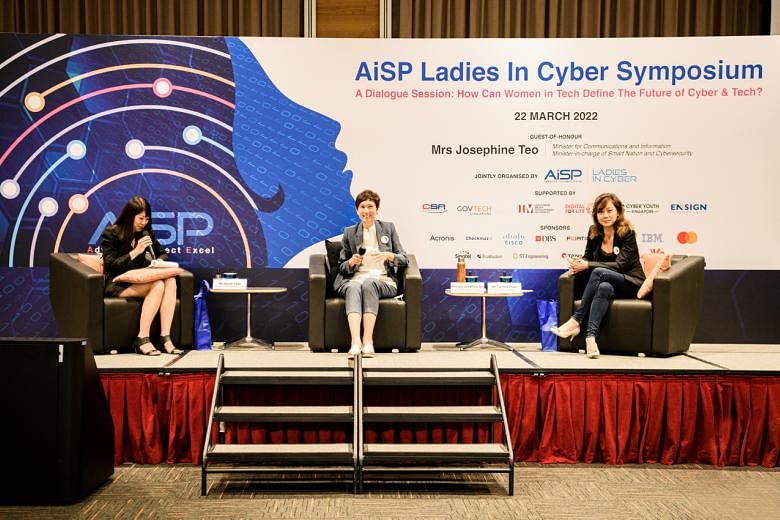Women can help ease talent crunch in cyber-security industry: Josephine Teo

(From left) AiSP vice-president Sherin Lee, Minister for Communications and Information Josephine Teo and Ensign InfoSecurity group CEO Tammie Tham. PHOTO: AISP

Rei Kurohi
Tech Correspondent
PUBLISHED
22 MAR 2022, 6:56 PM SGT
SINGAPORE - Bringing more women into the cyber-security industry can alleviate the talent crunch and reduce groupthink, leading to better tech solutions in the long term, said panellists at the inaugural Ladies in Cyber Symposium on Tuesday (March 22).
They noted that efforts are needed to counter attitudes and stereotypes that paint the tech industry as a male domain.
The panel discussion featured Minister for Communications and Information, Mrs Josephine Teo, who is also the minister in charge of cyber security and the Smart Nation initiative, Ensign InfoSecurity group chief executive Tammie Tham, and Ms Teo Yi-Ling, a senior fellow at the Centre of Excellence for National Security of the S. Rajaratnam School of International Studies.
Ms Sherin Lee, who is vice-president of the Association of Information Security Professionals (AiSP), moderated the session.
Mrs Teo said cyber security is essential not only to Singapore's Smart Nation ambitions but also to its survival.
"It's not just commercial entities whose systems can be impacted. A whole nation's critical infrastructure can be targets for cyber attacks," she said.
"In a military conflict, if your critical infrastructure is not well protected, you can well imagine how much risk you put your people through. The delivery of essential services could be at risk of being disrupted."
Singapore, like many other countries, is facing a shortage of tech talent, said Mrs Teo, adding that there are many available well-paid jobs requiring new skill sets that women can take up.
The minister said Singapore fares relatively well when it comes to representation of women in the tech industry.
She noted that women make up about 41 per cent of Singapore's tech workforce, in contrast with the global average of 28 per cent, according to a report published by the Boston Consulting Group and the Infocomm Media Development Authority (IMDA) in 2020.
But more can be done to further raise awareness of the available opportunities and help women take up leadership roles in the industry, Mrs Teo added.
Ms Tham said the industry needs a diverse pool of talent given the dynamic nature of cyber threats.
"We need everybody. We do not want what is known as groupthink - a group of people coming from similar backgrounds, having gone through similar life experiences, solving a cyber-security problem," she said.
"We like diversity in approaching cyber-security challenges... to be able to think like an attacker, an offender, and at the same time having that noble aspiration to want to do good."
The power of mentorship: What this software engineer wants women to know about finding career success in tech
Early exposure essential to draw more girls into science, tech careers: Panellists
Ms Teo said many women and girls are still being taught stereotypes, like the idea that science, technology, engineering and mathematics (Stem) are subjects more suitable for boys, and this messaging can come from parents, teachers, peers and the media.
She noted that women and girls remain in the minority in Stem cohorts at institutes of higher learning despite there being no formal barriers or quotas limiting them from enrolling.
There is also the narrative that there may be roles in the tech industry that involve "soft skills" which are more suitable for women, Ms Teo said. While this might be well-intentioned and aimed at encouraging women to "put one foot into the industry", it can also send the wrong signal to girls who are interested in pursuing the technical "hard skills", she added.
The symposium, organised by the AiSP, was aimed at helping female tertiary students and young professionals gain insights on the cyber-security industry here, including potential career opportunities and mentoring by volunteers who are professionals in the industry.
About 150 participants attended the symposium at the Lifelong Learning Institute in Paya Lebar, including those who joined the sessions over Zoom.
